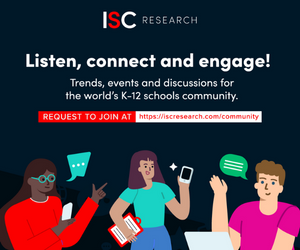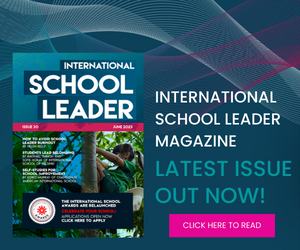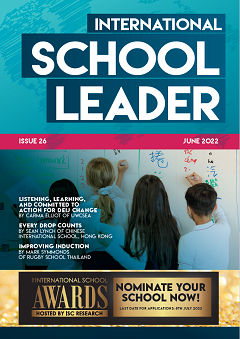By Holly Sullivan
The digital drama initiative at the Alice Smith School in Malaysia turned a challenging situation forced by the pandemic into a new and innovative approach. It has diversified and electrified our curricular and extracurricular offers through cutting-edge approaches to theatre design and communication technology.
The main challenge we initially faced was how to adapt our kinaesthetic, groupwork-focused curriculum for online learning. We wanted to make sure that our distance-learning approach through technology did not increase the distance between students and teachers. So, our aim was to ensure our subject remained connected with, and exciting for, our students. Now that we are back to face-to-face learning, our curriculum has again shifted to cement the inclusion of communication and digital technologies so that our students’ experience remains at the avant-garde of professional practice.
Building connections with the performing arts industry
Embedding digital communication opportunities across the drama curriculum has widened the scope for student engagement with professional industry roles. Students are solving the problem of how to effectively develop performances within an online space. They are developing their devising skills by working with professional theatre companies such as Paper Birds and Splendid Productions in live workshops facilitated via Zoom. We have witnessed genuine innovation by students, notably an A-level drama student who went on to achieve an A grade, in part due to researching, interviewing and applying the advice of world-leading sound designer, Gareth Fry. The impact of contacting him was that she based her approach to binaural three-dimensional sound on his Olivier-award-winning design for Complicité’s The Encounter.
Our extracurricular offer has been enhanced by looking to the theatre industry’s digital lead. Our school production of Daisy Pulls It Off was originally rehearsed for the stage but, in the face of COVID restrictions, was reimagined digitally, taking influence from National Theatre Live techniques of filming staged theatre. Students are now developing skills in acting-for-camera as well as considering post-production roles including editing and dubbing.
Our investment in cutting-edge digital practice has become more than just a replacement for pre-COVID teaching; our online productions, workshops and rehearsals have developed original content and a pedagogical approach in their own right.
Digital drama has also opened up opportunities to directly access top industry professionals who would not ordinarily have made it out to Malaysia. Our students have reached out and interviewed theatre professionals in a range of roles, including director Kirsty Housley, actor Niamh Walsh and West End make-up artist Tanya Noor. These experiences have supported our students’ growth as theatre-makers and opened up their awareness of the creative industries in ways that weren’t possible before.
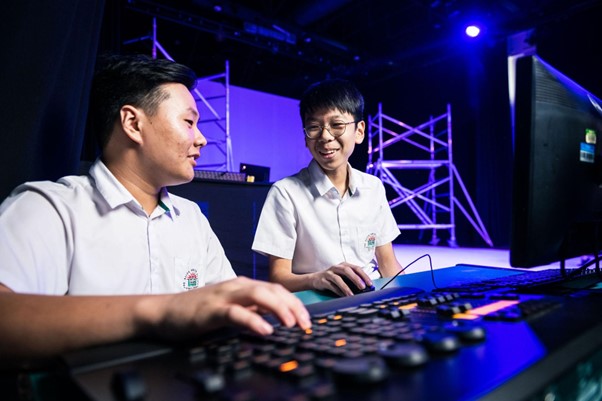
Photo: Alice Smith School students
Effective use of communication technology
The strict COVID measures in Malaysia meant our students could have been in danger of having a very limited drama education. Instead, students in each year took the opportunity to engage in experiential digital drama, such as an outstanding live production of Us and Them in which students found they could imaginatively incorporate Zoom backgrounds to indicate shifting locations. Older students expanded their concept of theatre by adopting ‘live cinema’ techniques, which fused film and theatre in cross-form learning.
High levels of collaboration have been one of the highlights of the initiative. For example, when one member of the cast was stuck overseas, students developed a hybrid performance which involved working out how best they could use their limited time to devise a plan, with one cast member accessing rehearsals via Zoom. The final hybrid performance saw the cast perform live in Kuala Lumpur alongside a projected performance by the quarantining student.
In the early days of our digital drama, the feeling was that text-based work was all that could be facilitated. Yet by pushing the limits of communication tech, during lockdown, students remained connected through the creation of stage combat chains, which they filmed and edited at home and which were judged by professional stunt actors at The Stunt Pod .
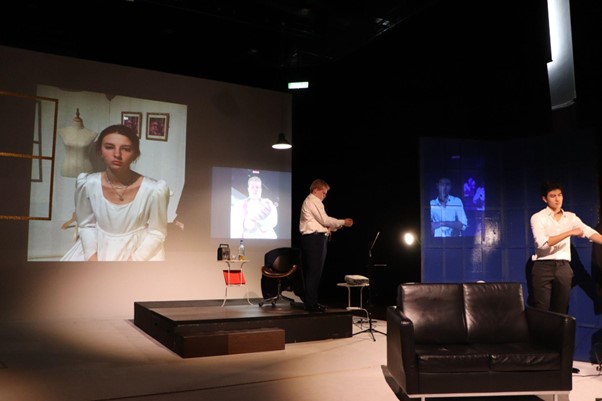
Photo: Alice Smith School students
Embedding technical theatre across the curriculum
Our initiative to embed technical theatre has been student-driven with many opportunities for peer-teaching; the young people themselves were best placed to lead with emerging technologies. One example of this is our student leaders teaching younger students stage make-up skills for our inter-house drama competition with the winning design ultimately judged by the students themselves.
The digital drama initiative will continue to embed communication tech throughout our curriculum and performances. Many of the resources we have discovered will now become a standard part of our practice. Students learn about sound effects using the BBC Sound Effects archive and create their own foley sound designs. Students learn about costume design in The Tempest scheme using software that allows them to make fabric choices from sustainable and recycled materials. Our ‘Play the Critic’ scheme places students in the role of reviewer of previously inaccessible theatre that has now been shared online.
Our online productions, workshops and rehearsals have developed original content and a pedagogical approach in their own right.
Future-proofing
We have ensured our initiative is sustainable in the event of staff changes through the investment in subject-specific technology and the embedding of digital media in schemes across the drama curriculum. We have moved away from a ‘sage on the stage’ teaching approach to a culture where our students are at the forefront of leading technical innovations and sharing their discoveries with peers and teachers. By remaining curious and open to developments in technology we have future-proofed the initiative so it remains responsive, with the student experience at its heart.
This helps future-proof an area of education that is highly vulnerable to disruption. Schools in our region often close due to air quality, political upheaval or natural disasters. It is therefore important to maintain a digital focus that promotes opportunities for drama collaboration using communication technologies.
Building a digital drama initiative
- Reach out and build connections with the performing arts industry. We were delighted at how generously theatre professionals from all over the globe shared their skills with our students when we got in touch with them.
- Follow industry’s lead. During a time of rapid change we took inspiration from initiatives taking place in the performing arts industry, such as Zoom performances and filmed-as-live performances.
- Use your communication skills to your advantage. As theatre-makers, students and their teachers have a keen understanding of effective communication. As a result, we found we were able to make our work translate to an online space and still have impact and meaning.
- Embed theatre technology and design skills across the curriculum. In each year, our students now learn a holistic approach to theatre-making that centres the role and expertise of technicians and designers, alongside performers.
- Future-proof your curriculum by using student experts. Afford students the mantle of expertise in ever-changing technology in your drama studio and let them apply the understanding they have of social media, gaming and communication to enhance your curriculum offer.

Holly Sullivan is Head of Creative and Expressive Arts Faculty at Alice Smith School in Kuala Lumpur, Malaysia. Connect directly with Holly on LinkedIn

